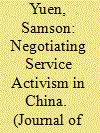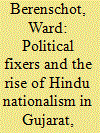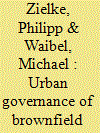| Srl | Item |
| 1 |
ID:
097446


|
|
|
| 2 |
ID:
145741


|
|
|
|
|
| Summary/Abstract |
Land requisitions for urban development have led to a rapid growth of wealthy, autonomous villages in southern China. However, the underlying causes of this emerging phenomenon and its impact on local governance have been largely unexplored by the existing literature. Through an in-depth analysis of the contestations and negotiations between the local state and villagers when dealing with the various problems arising from land compensation, this study explains how and why land requisitions strengthened the collective power of villagers in defending their rightful interests. This bolstered power has in turn forced the local state constantly to adjust its tactics when addressing the needs of villagers in order to avoid widespread conflicts and potential social unrest. The findings provide new insights into the complexities of land conflicts and their actual impact on state–village power restructuring in southern China.
|
|
|
|
|
|
|
|
|
|
|
|
|
|
|
|
| 3 |
ID:
158658


|
|
|
|
|
| Summary/Abstract |
The rise of government procurement has transformed the associational landscape in China. In many localities, local states have launched procurement programs to collaborate with NGOs, which in turn provide social services to community residents. While it has been argued that government funding shapes NGOs into compliant service providers, this article contends that state-funded NGOs are able to engage in advocacy through service delivery, a strategy known as ‘service activism’. By examining three NGOs in Guangdong Province, this article argues that NGOs’ success in service activism is determined by their degree of institutional embeddedness in the local state and the nature of their advocacy strategies. While both strongly or weakly embedded relationships can weaken the impact of advocacy, progressive strategies in sensitive issue areas can weaken collaboration and draw repression.
|
|
|
|
|
|
|
|
|
|
|
|
|
|
|
|
| 4 |
ID:
108990


|
|
|
|
|
| Publication |
2011.
|
| Summary/Abstract |
Political fixers are intermediaries who use political contacts and knowledge of official procedures to facilitate the interaction between citizens and state institutions. Fixers have become a prominent feature of India's democracy as facilitators of clientelistic exchanges between voters and politicians. Through a discussion of the functioning of political fixers in Gujarat's main city, Ahmedabad, this article argues that changes in voting behaviour can be explained by looking at (changes in) the way political fixers provide access to state resources. I argue that Hindu nationalist organisations managed to gain popularity among backward castes in Gujarat because of the dependence of these communities on political fixers. As the networks of older political fixers collapsed, Hindu nationalist organisations could win a local following by offering political fixers from backward castes new channels to access state resources.
|
|
|
|
|
|
|
|
|
|
|
|
|
|
|
|
| 5 |
ID:
144847


|
|
|
|
|
| Summary/Abstract |
Over the past several years, the creative reuse of brownfields has played a major role in Chinese cities to give their urban landscape a so-called second development. This paper analyses the governance of the brownfield restructuring in Guangzhou (Canton). The research is based on a study of the T.I.T Creative Industry Zone, a highly successful creative space currently in danger of demolition. This paper follows DiGaetano and Strom's (2003) analytical governance framework. This approach allows for deciphering the complexities of decision-making through a well-structured set of interdependent categories. In Guangzhou, new policies and institutions have been promoting the restructuring and have contributed to the formalisation of public–private interactions. In general, this indicates a shift towards a more corporatist governance. However, the study of T.I.T reveals a rather intricate picture: the policymaking remains influenced by a top-down authoritative style – sometimes in an arbitrary manner – and to some extent also by particularistic exchanges. This indicates a complex mode of urban governance consisting of increasingly corporatist elements but still with managerial, and to a lesser extent, clientelistic elements. Finally, the coexistence of different governance modes seems to be a typical outcome of China's transition while still remaining more adaptive, experimental and flexible in nature.
|
|
|
|
|
|
|
|
|
|
|
|
|
|
|
|